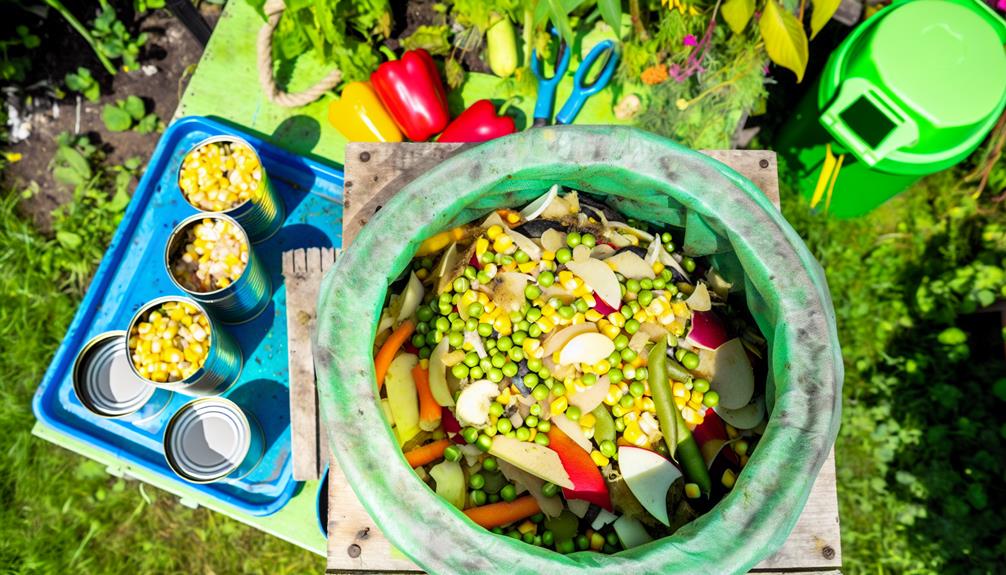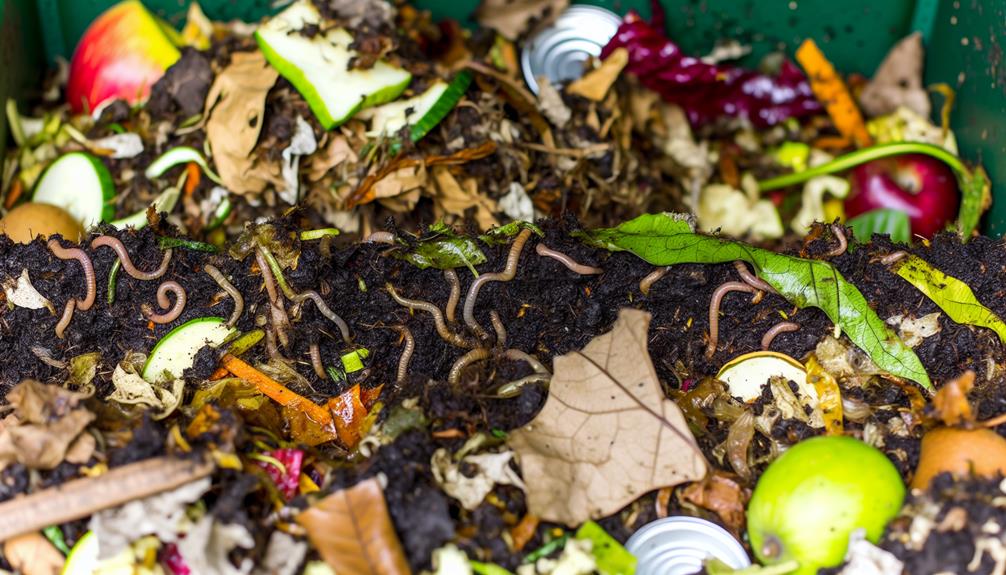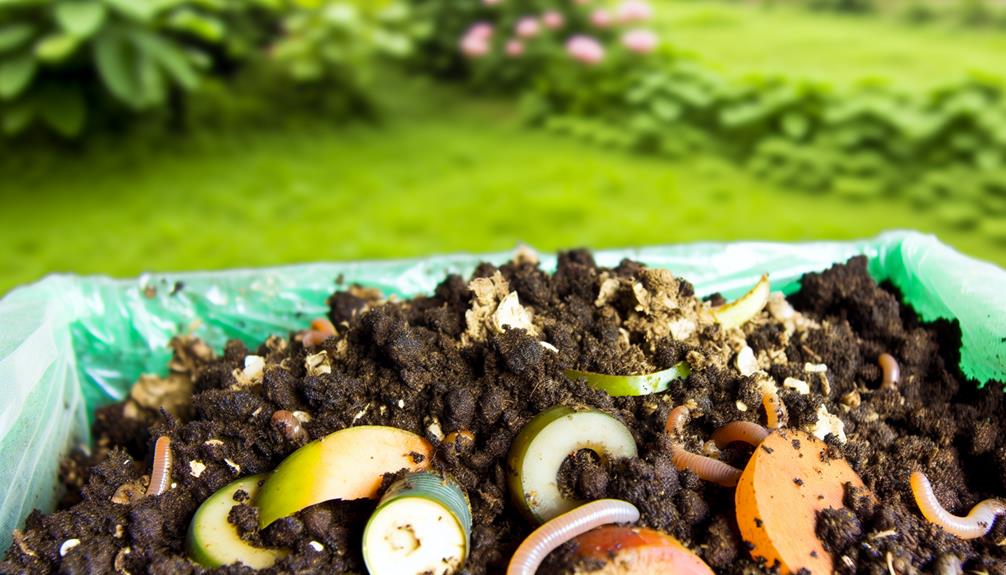

You can definitely compost canned vegetables! Start by draining and rinsing them to remove preservatives. Chop or mash the vegetables to help them break down faster. For a healthy compost, balance your carbon and nitrogen levels by mixing these veggies with brown materials like leaves or cardboard.
Remember to keep your compost moist and turn it regularly to speed up decomposition. While it might take up to three months, you’ll be thrilled with the nutrient-rich soil you create. Plus, you’re reducing waste and enriching your garden simultaneously! Stick around to discover more tips on perfecting your composting technique.
To effectively compost canned vegetables, start by draining any excess liquid to prevent moisture imbalance in your compost pile. Next, rinse the canned vegetables to remove any preservatives or additives that might slow down decomposition.
Once clean, chop or mash the vegetables to speed up the composting process. This helps break down the material more efficiently. Layer the chopped canned vegetables with brown materials like dry leaves or shredded paper. This method guarantees a healthy compost pile.
Remember to turn or mix the compost regularly to promote proper aeration and even distribution. By following these steps, you’re contributing to a thriving compost community, making your garden more sustainable and vibrant.
When composting canned vegetables, it’s vital to balance carbon and nitrogen levels to guarantee efficient decomposition. Canned foods tend to be high in nitrogen, so you’ll need to add carbon-rich materials like dry leaves or sawdust to achieve the ideal C:N ratio of 25:1 to 30:1.

Maintaining this balance is important because it promotes efficient decomposition and prevents issues like foul odors. Don’t forget to mix in various green and brown materials to create a nutrient-rich compost for your garden.
Proper moisture levels are also key; too much moisture from the canned vegetables can slow down the process, so balance it with dry materials. You’re creating a living, breathing ecosystem right in your backyard!
Also Read: Can You Compost Barbecue Sauce?
When composting canned vegetables, you might encounter a few challenges, like metal contamination from the cans, the impact of preservatives slowing down decomposition, and a reduction in nutrient value.
To address these issues, make sure to remove any metal pieces and mix the compost regularly to help break down the preservatives.
Adding extra brown materials like leaves or straw can also help balance the compost and maintain healthy bacteria levels.
Although composting can enrich your garden, metal can contamination poses significant risks by introducing harmful chemicals like BPA into the soil. Metal cans can leach BPA, a chemical linked to health issues, which can ultimately contaminate your compost and garden.
To avoid this, you should:
Being mindful about metal can contamination helps you build a safer, healthier compost pile. By taking these steps, you ensure your garden remains a thriving, vibrant community space.
Preservatives in canned vegetables can hinder the decomposition process in your compost pile. The preservative impact slows down the breakdown, making it harder for your compost to thrive.
But don’t worry, you can guarantee this! Adding extra brown materials like dried leaves or cardboard helps balance things out. Mixing in a variety of organic materials also aids the decomposition process.
Regularly turning the compost pile guarantees better aeration, speeding up the breakdown. Consider using a compost bin with good ventilation, as this promotes efficient decomposition.
Despite the challenges preservatives pose, another issue worth examining is the nutrient value reduction in canned vegetables. Processing can diminish some nutrients, but these vegetables still contribute valuable organic material to your compost.
To balance this nutrient reduction, you can supplement your compost with additional organic materials like leaves or grass.
Here are some tips:
Also Read: Can You Compost Animal Bedding?
When you add canned vegetables to your compost, anticipate them to take up to 3 months to decompose. The decomposition time depends on various factors, but with proper compost maintenance, you can help speed up the process.

Make sure your compost pile is well-aerated, moist, and balanced with green and brown materials, which promotes faster breakdown. Remember, adding canned vegetables too often can slow decomposition, so mix them in sparingly.
Regularly turning the compost and keeping an eye on its moisture levels will create an ideal environment for these veggies to break down. By following these steps, you become part of a community dedicated to sustainable and effective composting practices, contributing positively to the environment.
Also Read: Can You Compost Alfalfa Sprouts?
By composting canned vegetables, you greatly reduce methane emissions that would otherwise come from landfills. This simple act contributes to a healthier planet and enriches your compost pile with nitrogen-rich materials, essential for creating vibrant, fertile soil.
Consider these benefits:
You shouldn’t compost meat, dairy, or veggies treated with pesticides. Avoid onions, garlic, and citrus peels too. Tomatoes and peppers might sprout. Stick to safe, untreated vegetables, and you’ll have a thriving compost community!
Yes, you can compost canned beans. Just make sure you rinse them and remove the labels. They add nitrogen to your compost, so balance with brown materials. Composting them helps reduce waste and enriches your soil.
Yes, you can put canned tomatoes in compost. Just make sure you rinse the cans and remove the labels first. You’ll enrich your soil and help the environment by reducing landfill waste and greenhouse gas emissions.
You can definitely compost expired canned food! Just make sure to rinse the cans, remove labels, and shred the contents. Mixing them with other compost materials will help create a balanced, nutrient-rich fertilizer for your plants.
Composting canned vegetables is a fantastic way to reduce waste and enrich your soil! By preparing them properly and balancing carbon and nitrogen levels, you’ll create a nutrient-rich compost.
Be mindful of potential issues, but with patience, you’ll see them break down beautifully.
The benefits are substantial: healthier plants, less landfill waste, and a greener environment.
So, get excited about turning those canned veggies into compost gold and watch your garden thrive!
